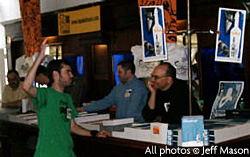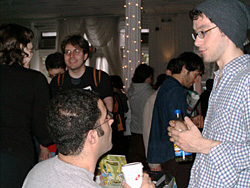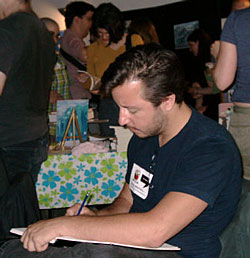>> Comment: A Shot Of MoCCA
>> Comment: He Could Be Wrong, He Could Be Wright
More...

My first order of business upon arriving at this year's MoCCA Art Festival was to draw the ire of the guy selling raffle tickets. Last year's crowd was around 2,000 people, which is a solid draw for a festival's first year. By noon, when I arrived at MoCCA, I'd wager a bet that the attendance had topped 2,000. I was expecting something a bit more lackadaisical and instead found myself at the ground zero of American Comic Art Festivals.
While trying to gain my bearings, I went back and forth with the raffle guy on whether or not I wanted to purchase a ticket. First I didn't. I just wanted to look at the LOONY TUNES animation cell that was one of the prizes. And then I said, "Sure, I'll take a ticket." And then I balked at paying five bucks for a ticket. And then I changed my mind, purchased a ticket and went outside for some air. When it comes right down to it: I enjoy a good raffle just like everyone else.
The MoCCA Art Festival is organised by the Museum of Comic and Cartoon Art. MoCCA is a non-profit organisation whose goal is to promote the understanding and appreciation of comic art as well as to collect, preserve and display all forms of comic and cartoon art. It's a wonderful organisation and it is run by some of the nicest people you'll ever meet. MoCCA is still looking for a permanent home for the museum, but it does have a display at its office that can be viewed by the general public.
What makes this year so important to the festival is that MoCCA will now be hosting the Harvey Awards. This was officially announced at the festival by MoCCA chairman Lawrence Klein. A special reception will take place later in the year to recognize 2003 Harvey Award Winners, many of whom were at the festival this year, such as Jessica Abel (ARTBABE), Eddie Campbell (FROM HELL, BACCHUS), Evan Dorkin (MILK & CHEESE, DORK), Phoebe Gloeckner (THE DIARY OF A TEENAGE GIRL), Mike Mignola (HELLBOY), Frank Miller (SIN CITY, THE DARK KNIGHT RETURNS), Jeff Smith (BONE) and Craig Thompson (GOOD-BYE CHUNKY RICE). This is all good news for the community and further proof that New York City is the centre of the universe.
 New York City is integral to the history of comics. Modern comics were born here and by modern I'm trying to supersede any comments online pundits might make in reference to the birth of comic art by the Dutch in the Middle Ages, or cave painting. Someone could surely trace the history of comics back to an Indian Petroglyph. It's an almost easy jump to make. George Herriman's landscapes in KRAZY KAT were derivative of the American Southwest. Petrogyphs can be found on caves and rock formations in the Southwest.
New York City is integral to the history of comics. Modern comics were born here and by modern I'm trying to supersede any comments online pundits might make in reference to the birth of comic art by the Dutch in the Middle Ages, or cave painting. Someone could surely trace the history of comics back to an Indian Petroglyph. It's an almost easy jump to make. George Herriman's landscapes in KRAZY KAT were derivative of the American Southwest. Petrogyphs can be found on caves and rock formations in the Southwest.
I'm digressing. My point: it wasn't too long ago that comics were churned out in comic sweatshops tucked here and there all over Manhattan. Much less, it wasn't too long ago that creators were able to own the rights to their characters.
So while the Harveys are generally held at a comic convention, having them at MoCCA makes it somehow a bit more special and adds to the celebratory meeting of comic minds that the day holds. What's important, really, is not that the Harvey Awards are going to be held in New York City, but that they've now found a permanent home. The attention and importance of the award show being affiliated with MoCCA is a positive step towards the Museum of Comic and Cartoon Art finding a permanent home for itself.
Like all non-profit organisations, MoCCA is staffed largely by volunteers who donate their time to help at the festival or at the office. Having the annual festival held at the Puck Building in SoHo adds a certain amount of class to the affair. The Puck is generally used for fashion shows and expensive wedding banquets. It's appropriate for a comic art fest in these times where comics are gaining credibility and media exposure. If Grant Morrison wants comic creators and fans to be more like rock stars, holding conventions in SoHo is one way to do it.
The first person I talked to at the convention was James Kochalka (MONKEY VS ROBOT, SKETCHBOOK DIARIES). When I told Kochalka that I'd recently reviewed the new MONKEY VS. ROBOT book, he looked up from the exquisite corpse he was working on and waited for me to continue. "I gave it a positive review," I said.
"That was my next question," he said, "the only review I read of it basically said that it shouldn't exist."
After speaking with James Kochalka I stopped by Eddie Campbell's booth and picked up a copy of ALEC: THREE PIECE SUIT. He was selling a few pages of original art from FROM HELL, and the two issues of his Egomania magazine were also stacked on the table. When I asked Mr. Campbell if he intended to self-publish any more comics/magazines in the Egomania and BACCHUS format, he visibly winced.
 "I put the books out and did what I could," he said, "but the distribution just didn't pick up. There were 2,000 orders for it. I'd like to do it again, but right now it's just - fuck it." He shrugged. Comic creators are a tough lot. However, I don't think there's a single creator at MoCCA - either sitting in a booth or passing out copies of their mini-comic to passersby - who doesn't have the tenacity of a cockroach.
"I put the books out and did what I could," he said, "but the distribution just didn't pick up. There were 2,000 orders for it. I'd like to do it again, but right now it's just - fuck it." He shrugged. Comic creators are a tough lot. However, I don't think there's a single creator at MoCCA - either sitting in a booth or passing out copies of their mini-comic to passersby - who doesn't have the tenacity of a cockroach.
It's the sense of community that holds everything together. Instead of lamenting the low reader response to his EGOMANIA, Campbell made it a point to recommend picking up Craig Thompson's new book BLANKETS. "If you like the ALEC autobiographical stuff, check it out," he said. BLANKETS was this year's hot book at MoCCA and Craig Thompson seemed to be head down signing copies all throughout the afternoon.
I wandered back through the main hall in hopes of getting a moment to speak with Mike Mignola, who was sharing a booth with Klaus Jansen, and they were right around the corner from Gary Groth and the Comics Journal guys. I stood around Mike Mignola's booth for a little while discussing the HELLBOY movie. I'd recently seen a few stills from the film that featured Ron Perlman in the full Hellboy makeup. I told Mike that I thought he looked great.
"Oh yeah," Mignola said, "It's amazing. I couldn't be any happier. Everything looks just the way I wanted it to. I was a little nervous to see the dailies, but when I did - I'm just really happy. [Guillermo] del Toro really knows what he's doing. It's strange. There was a point when I was visiting the set - and I had some personal problems - and I was sitting around with Ron [Perlman] who was in the complete Hellboy makeup. It was an odd moment for me to be discussing my personal problems to my creation. That's for the books."
Certainly, it's one thing to be muttering at your computer screen or drawing table, but another thing entirely to be chatting with someone dressed as a figment of your creative consciousness.
But not really. If you consider that the small press is nearly dominated by autobiographical works, comic artists are continually talking to themselves every day. Eddie Campbell, for one, has documented most of his life with his series of ALEC comics. James Kochalka posts a daily diary comic. While standing outside getting some air, a friend commented on Kochalka's diary comic as an odd thing. "I mean," she said, "it must be so strange for complete strangers to walk up to you and say, 'How's Amy [Kochalka's wife]?' Or, 'I like the colour you chose to paint your house.'"
Art is inherently an act of communication whether you're using a pseudonym in a comic strip, drawing yourself as an elf or talking about your personal problems with Hellboy. This is MoCCA's greatest strength. The nature of the festival easily lends itself to the credibility of the small press scene. Other than a few artists and writers, there is no presence from the big three companies, and in fact the largest publisher is probably Top Shelf. Or perhaps the unknowing corporation or business that is freely supplying the use of its copy machine to bolster a struggling mini-comic creator.
At any rate, MoCCA doesn't cater only to the small press or to the mainstream. Its purpose is to celebrate all comic art and the small press dominates the festival solely because the small press is made up of random weirdoes who are driven for reasons they can't always verbalise to put some portion of their life on paper, fold the paper in half, staple it and begin handing it for strangers approval.
 The Internet has done much to change the face of the small press, especially for those seeking to break-in through self-publishing. For one thing, you can reach bazillions of people at any time day or night. Web comics also allow for a range of possibilities that print comics don't allow, and vice versa.
The Internet has done much to change the face of the small press, especially for those seeking to break-in through self-publishing. For one thing, you can reach bazillions of people at any time day or night. Web comics also allow for a range of possibilities that print comics don't allow, and vice versa.
Really now, when was the last time you picked up one of those odd-shaped, cheaply put-together things by someone you've never heard of in lieu of BATMAN, or EIGHTBALL, or anything else? I'm guilty of it. I'll judge a comic shop negatively if it doesn't have a mini-comics section, but when it comes down to buying one, somehow I can rarely spare the money.
Being on the cusp of poverty influences this decision quite a bit really, but the point stands. So I'm not preaching. I'm not saying that it's your duty to go out and buy mini-comics exclusively. I'm also not advising you against this course of action.
One great webcomic that I came across at MoCCA was A CHIPMUNK AND A LIZARD by Jon Thayer and Howard August. They'd pressed a set of colour mini-comics specifically for MoCCA, and I picked up a few. I'd never heard of them before, but the display on their table of tiny cartoon lizards, ducks and whatnot caught my eye. In one of the books, the chipmunk turns to the lizard and says, "You should come over tonight... I'm making my mother's recipe for meatloaf."
"Is it any good?" the lizard asks.
"Not really," the chipmunk says, "...but it's very sentimental."
Here's the crux of the matter: whether you're developing a daily online strip or printing twenty-five copies of a mini-comic at Kinko's at three in the morning - or when the boss isn't looking - you still have to hustle your work around.
One of my old writing teachers, Stephen Wright (author of GOING NATIVE, and not the stand up comedian), once told me that writing doesn't exist in a vacuum. The same could be said for any creation of art. As a creator, every aspect of your life and those around you affects what you make. So the end result, the product itself, doesn't exist in a vacuum. And once the mini-comic is in your hands, it exists. It's tangible and it's no longer in your head.
MoCCA is a reminder that there is a community of people who care about the creation of comics and they're especially kind to those of us wandering around with a fresh batch of comics that were printed, folded and stapled by hand. And that's nice to know, because MoCCA not only makes it easy to hustle one's work, the festival makes it fun, too.

This article is Ideological Freeware. The author grants permission for its reproduction and redistribution by private individuals on condition that the author and source of the article are clearly shown, no charge is made, and the whole article is reproduced intact, including this notice.


